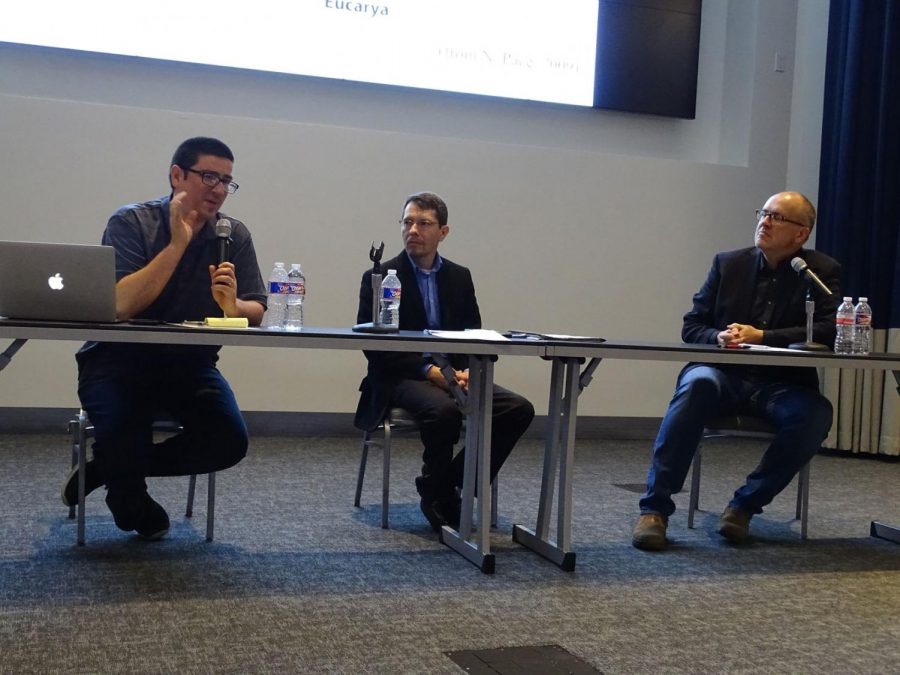Evolution debate persists despite objections from science professors, dean
Joel Velasco, left, Stephen Dilley, center, and Paul Nelson, right, at a debate about Darwin’s evolution theory Oct. 21.
Two philosophers of biology debated before a full auditorium at the controversial event, “Is Darwin’s theory flourishing or floundering? A debate.”
Held in Jones Auditorium Oct. 21, the debate was sponsored in part by the Hill Country Institute, a nonprofit organization that focuses on “inspiring thoughtful, informed Christians to actively engage contemporary culture with the love and mind of Christ,” according their website.
At the event, guest speakers Joel Velasco of Texas Tech University and Paul Nelson of the Discovery Institute debated the theory of common ancestry, “the view that all of life on Earth descended from a single organism that lived long ago,” according to Stephen Dilley, associate professor of philosophy and organizer of the debate.
Although neither of the participants are biologists by training, both Nelson and Velasco have studied evolutionary theory and, according to Dilley, both drew upon evidence from peer-reviewed science journals to support their arguments.
During the debate, Velasco defended common descent and Nelson challenged it. Both speakers introduced complex scientific ideas to the discussion to defend their positions, focusing mainly on aspects of molecular genetics and phylogenetics.
“I’m sure some of the audience were confused or couldn’t follow all the details — but that is how we learn. No difficult topic is fully accessible when we first meet it,” Nelson said. “If Joel’s presentation and mine helped to spark curiosity about historical biology among students or the general public, the event was worth doing.”
The audience, which included several of Dilley’s students who were required to attend, did not challenge either of the speakers during the question period.
Peter Beck, one of the professors present at the event, teaches environmental science and policy and was disappointed with the organization of the debate.
Beck mentioned that he thought it was misleading to have two non-biologists talk about the state of knowledge in biology without any biologist there to attest to its veracity.
“For example, the opponent’s arguments rested on the claims that there was no evolutionary explanation for orphan genes and therefore that nullifies common ancestry,” Beck said. “While this might sound convincing to general audiences, without an evolutionary biologist to explain the position on either of those claims, we have no basis to evaluate this position.”
Senior Bianca Rosas had similar concerns. A pre-med major, Rosas felt that although the discussion was at times accessible, it included information that was hard to understand without previous knowledge of certain biological concepts.
“Not everyone knows what a topoisomerase is,” Rosas said regarding part of one of the arguments presented during the debate.
“I think the debate in itself was inappropriate,” Rosas said. “They’re not scientists, they’re philosophers. It’s exactly the same as if two of my science professors had read a lot of philosophy papers and then had a debate about philosophy.”
Beck, like other science professors had done earlier this week, shared Rosas’ sentiments.
“A primary objective of the St. Edward’s mission is critical thinking and being able to evaluate the reliability of sources is a crucial component to this,” Beck said. “This is especially true with the vast amount of conflicting information available on the internet. I would not go to a biologist to get an expert opinion on Hegel’s theories and I would be disappointed if this debate gave the indication that the sources of evidence are not important.”
Senior Garrett Martin on the other hand, felt that the debate expanded his views on evolutionary theory immensely.
“I’m not a science major and I’m not privy to this info on a regular basis, but I would say that my prior assumptions and prior knowledge of evolution and science as an industry is being challenged as we go throughout this debate,” Martin said during the interim.
“I look at this whole conversation tonight just as one of those little dialogues going on out there in this world that can shape how we think of science,” Martin said.







